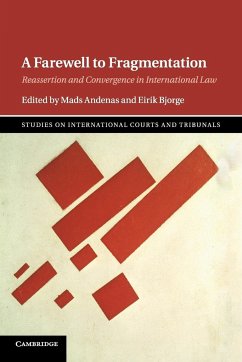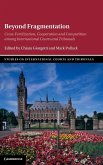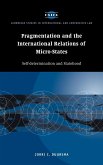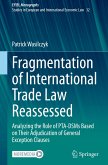A Farewell to Fragmentation
Herausgeber: Andenas, Mads; Bjorge, Eirik
A Farewell to Fragmentation
Herausgeber: Andenas, Mads; Bjorge, Eirik
- Broschiertes Buch
- Merkliste
- Auf die Merkliste
- Bewerten Bewerten
- Teilen
- Produkt teilen
- Produkterinnerung
- Produkterinnerung
Explores the role of the International Court of Justice in the re-convergence of international law.
Andere Kunden interessierten sich auch für
![A Farewell to Fragmentation A Farewell to Fragmentation]() A Farewell to Fragmentation157,99 €
A Farewell to Fragmentation157,99 €![Beyond Fragmentation Beyond Fragmentation]() Beyond Fragmentation111,99 €
Beyond Fragmentation111,99 €![Fragmentation and the International Relations of Micro-States Fragmentation and the International Relations of Micro-States]() Jorri DuursmaFragmentation and the International Relations of Micro-States246,99 €
Jorri DuursmaFragmentation and the International Relations of Micro-States246,99 €![A Farewell to Private Arms? A Farewell to Private Arms?]() Benjamin WildA Farewell to Private Arms?32,99 €
Benjamin WildA Farewell to Private Arms?32,99 €![Armed Conflicts and the Environment Armed Conflicts and the Environment]() Anne DieneltArmed Conflicts and the Environment149,79 €
Anne DieneltArmed Conflicts and the Environment149,79 €![Armed Conflicts and the Environment Armed Conflicts and the Environment]() Anne DieneltArmed Conflicts and the Environment104,99 €
Anne DieneltArmed Conflicts and the Environment104,99 €![Fragmentation of International Trade Law Reassessed Fragmentation of International Trade Law Reassessed]() Patrick WasilczykFragmentation of International Trade Law Reassessed119,99 €
Patrick WasilczykFragmentation of International Trade Law Reassessed119,99 €-
-
-
Explores the role of the International Court of Justice in the re-convergence of international law.
Hinweis: Dieser Artikel kann nur an eine deutsche Lieferadresse ausgeliefert werden.
Hinweis: Dieser Artikel kann nur an eine deutsche Lieferadresse ausgeliefert werden.
Produktdetails
- Produktdetails
- Verlag: Cambridge University Press
- Seitenzahl: 604
- Erscheinungstermin: 21. August 2018
- Englisch
- Abmessung: 229mm x 152mm x 33mm
- Gewicht: 862g
- ISBN-13: 9781107442436
- ISBN-10: 1107442435
- Artikelnr.: 53772338
- Herstellerkennzeichnung
- Libri GmbH
- Europaallee 1
- 36244 Bad Hersfeld
- gpsr@libri.de
- Verlag: Cambridge University Press
- Seitenzahl: 604
- Erscheinungstermin: 21. August 2018
- Englisch
- Abmessung: 229mm x 152mm x 33mm
- Gewicht: 862g
- ISBN-13: 9781107442436
- ISBN-10: 1107442435
- Artikelnr.: 53772338
- Herstellerkennzeichnung
- Libri GmbH
- Europaallee 1
- 36244 Bad Hersfeld
- gpsr@libri.de
List of contributors; 1. Introduction: from fragmentation to convergence
Mads Andenas and Eirik Bjorge; Part I. Reassertion and Convergence:
'Proliferation' of Courts and the Centre of International Law; Section A.
At the Centre: The International Court: 2. Unity and diversity in
international law Christopher Greenwood; 3. A century of international
justice and prospects for the future Antônio Augusto Cançado Trindade; 4.
The International Court of Justice and human rights treaty bodies Nigel
Rodley; 5. The ICJ and the challenges of human rights law Vera
Gowlland-Debbas; 6. Factors influencing fragmentation and convergence in
international courts Philippa Webb; Section B. 'Regimes' of International
Law: 7. Fragmentation or partnership? The reception of ICJ case-law by the
European Court of Human Rights Dean Spielmann; 8. Factors influencing the
reception of international law in the case law of the ECtHR's case law: a
review Magdalena Forowicz; 9. The influence of the International Court of
Justice on the law of provisional measures Cameron A. Miles; 10. Just
another case of treaty interpretation? Reconciling humanitarian and human
rights law in the ICJ Lawrence Hill-Cawthorne; 11. Fragmentation within
international human rights law Mehrdad Payandeh; 12. The European Union's
participation in international economic institutions: a mutually beneficial
reassertion of the centre Emanuel Castellarin; 13. Reinforcing the ICJ's
central international role? Domestic courts' enforcement of ICJ decisions
and opinions Veronika Fikfak; Part II. A Farewell to Fragmentation and the
Sources of International Law; Section A. Custom and Jus Cogens: 14. The
International Court of Justice and the international customary law game of
cards Lorenzo Gradoni; 15. State practice, treaty practice and state
immunity Alexander Orakhelashvili; 16. Historical sketches of custom in
international law Jean-Louis Halpérin; Section B. Treaty Interpretation:
17. Is there a subject-matter ontology in interpretation of international
legal norms? Robert Kolb; 18. Halfway between fragmentation and
convergence: the role of the rules of the organization in the
interpretation of constituent treaties Paolo Palchetti; 19. The convergence
of the methods of treaty interpretation Eirik Bjorge; 20. The centre
reasserting itself Mads Andenas; Index.
Mads Andenas and Eirik Bjorge; Part I. Reassertion and Convergence:
'Proliferation' of Courts and the Centre of International Law; Section A.
At the Centre: The International Court: 2. Unity and diversity in
international law Christopher Greenwood; 3. A century of international
justice and prospects for the future Antônio Augusto Cançado Trindade; 4.
The International Court of Justice and human rights treaty bodies Nigel
Rodley; 5. The ICJ and the challenges of human rights law Vera
Gowlland-Debbas; 6. Factors influencing fragmentation and convergence in
international courts Philippa Webb; Section B. 'Regimes' of International
Law: 7. Fragmentation or partnership? The reception of ICJ case-law by the
European Court of Human Rights Dean Spielmann; 8. Factors influencing the
reception of international law in the case law of the ECtHR's case law: a
review Magdalena Forowicz; 9. The influence of the International Court of
Justice on the law of provisional measures Cameron A. Miles; 10. Just
another case of treaty interpretation? Reconciling humanitarian and human
rights law in the ICJ Lawrence Hill-Cawthorne; 11. Fragmentation within
international human rights law Mehrdad Payandeh; 12. The European Union's
participation in international economic institutions: a mutually beneficial
reassertion of the centre Emanuel Castellarin; 13. Reinforcing the ICJ's
central international role? Domestic courts' enforcement of ICJ decisions
and opinions Veronika Fikfak; Part II. A Farewell to Fragmentation and the
Sources of International Law; Section A. Custom and Jus Cogens: 14. The
International Court of Justice and the international customary law game of
cards Lorenzo Gradoni; 15. State practice, treaty practice and state
immunity Alexander Orakhelashvili; 16. Historical sketches of custom in
international law Jean-Louis Halpérin; Section B. Treaty Interpretation:
17. Is there a subject-matter ontology in interpretation of international
legal norms? Robert Kolb; 18. Halfway between fragmentation and
convergence: the role of the rules of the organization in the
interpretation of constituent treaties Paolo Palchetti; 19. The convergence
of the methods of treaty interpretation Eirik Bjorge; 20. The centre
reasserting itself Mads Andenas; Index.
List of contributors; 1. Introduction: from fragmentation to convergence
Mads Andenas and Eirik Bjorge; Part I. Reassertion and Convergence:
'Proliferation' of Courts and the Centre of International Law; Section A.
At the Centre: The International Court: 2. Unity and diversity in
international law Christopher Greenwood; 3. A century of international
justice and prospects for the future Antônio Augusto Cançado Trindade; 4.
The International Court of Justice and human rights treaty bodies Nigel
Rodley; 5. The ICJ and the challenges of human rights law Vera
Gowlland-Debbas; 6. Factors influencing fragmentation and convergence in
international courts Philippa Webb; Section B. 'Regimes' of International
Law: 7. Fragmentation or partnership? The reception of ICJ case-law by the
European Court of Human Rights Dean Spielmann; 8. Factors influencing the
reception of international law in the case law of the ECtHR's case law: a
review Magdalena Forowicz; 9. The influence of the International Court of
Justice on the law of provisional measures Cameron A. Miles; 10. Just
another case of treaty interpretation? Reconciling humanitarian and human
rights law in the ICJ Lawrence Hill-Cawthorne; 11. Fragmentation within
international human rights law Mehrdad Payandeh; 12. The European Union's
participation in international economic institutions: a mutually beneficial
reassertion of the centre Emanuel Castellarin; 13. Reinforcing the ICJ's
central international role? Domestic courts' enforcement of ICJ decisions
and opinions Veronika Fikfak; Part II. A Farewell to Fragmentation and the
Sources of International Law; Section A. Custom and Jus Cogens: 14. The
International Court of Justice and the international customary law game of
cards Lorenzo Gradoni; 15. State practice, treaty practice and state
immunity Alexander Orakhelashvili; 16. Historical sketches of custom in
international law Jean-Louis Halpérin; Section B. Treaty Interpretation:
17. Is there a subject-matter ontology in interpretation of international
legal norms? Robert Kolb; 18. Halfway between fragmentation and
convergence: the role of the rules of the organization in the
interpretation of constituent treaties Paolo Palchetti; 19. The convergence
of the methods of treaty interpretation Eirik Bjorge; 20. The centre
reasserting itself Mads Andenas; Index.
Mads Andenas and Eirik Bjorge; Part I. Reassertion and Convergence:
'Proliferation' of Courts and the Centre of International Law; Section A.
At the Centre: The International Court: 2. Unity and diversity in
international law Christopher Greenwood; 3. A century of international
justice and prospects for the future Antônio Augusto Cançado Trindade; 4.
The International Court of Justice and human rights treaty bodies Nigel
Rodley; 5. The ICJ and the challenges of human rights law Vera
Gowlland-Debbas; 6. Factors influencing fragmentation and convergence in
international courts Philippa Webb; Section B. 'Regimes' of International
Law: 7. Fragmentation or partnership? The reception of ICJ case-law by the
European Court of Human Rights Dean Spielmann; 8. Factors influencing the
reception of international law in the case law of the ECtHR's case law: a
review Magdalena Forowicz; 9. The influence of the International Court of
Justice on the law of provisional measures Cameron A. Miles; 10. Just
another case of treaty interpretation? Reconciling humanitarian and human
rights law in the ICJ Lawrence Hill-Cawthorne; 11. Fragmentation within
international human rights law Mehrdad Payandeh; 12. The European Union's
participation in international economic institutions: a mutually beneficial
reassertion of the centre Emanuel Castellarin; 13. Reinforcing the ICJ's
central international role? Domestic courts' enforcement of ICJ decisions
and opinions Veronika Fikfak; Part II. A Farewell to Fragmentation and the
Sources of International Law; Section A. Custom and Jus Cogens: 14. The
International Court of Justice and the international customary law game of
cards Lorenzo Gradoni; 15. State practice, treaty practice and state
immunity Alexander Orakhelashvili; 16. Historical sketches of custom in
international law Jean-Louis Halpérin; Section B. Treaty Interpretation:
17. Is there a subject-matter ontology in interpretation of international
legal norms? Robert Kolb; 18. Halfway between fragmentation and
convergence: the role of the rules of the organization in the
interpretation of constituent treaties Paolo Palchetti; 19. The convergence
of the methods of treaty interpretation Eirik Bjorge; 20. The centre
reasserting itself Mads Andenas; Index.








